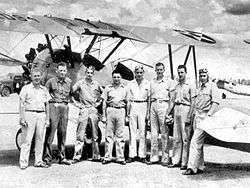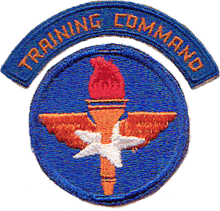29th Flying Training Wing (U.S. Army Air Forces)
| 29th Flying Training Wing | |
|---|---|
 Flight instructors with a PT-17 Stearman biplane trainer]  ] ]Fairchild PT-19 monoplane trainer | |
| Active | 1942-1946 |
| Country | United States |
| Branch | United States Army Air Forces |
| Type | Command of flying training units |
| Role | Training |
| Part of | Army Air Forces Training Command |
| Engagements |
|
| Commanders | |
| 26 December 1942 | Col Fred C. Nelson |
| 10 February 1943 | Brig Gen John G. Williams |
| 4 April 1945 | Col Raymond L. Winn |
| 25 May - 1 November 1945 | Brig Gen Clinton D. Vincent |
| through 16 Jun 1946 | Unknown |
_-_Map.png)
The 29th Flying Training Wing is an inactive United States Air Force unit. It was last assigned to the Western Flying Training Command, and was disbanded on 16 June 1946 at Napier Field, Alabama. The wing controlled World War II Phase One primary flying training units of the Army Air Forces Training Command. Headquartered at Moody Field, Georgia for most of its operational service, it controlled contract civilian-operated pilot schools primarily in the Southeastern United States.
There is no lineage connection between the 29th Flying Training Wing, established on 22 December 1939 as the 29th Bombardment Group (Heavy) at Langley Field, Virginia, and this organization.
History
Until 1939, the United States Army Air Corps provided all flying training with military instructor pilots. Beginning in 1939, it contracted with nine civilian flying schools to provide primary flight training. Primary training consisted of a three-month course of 65 hours of flying instruction. As the United States prepared to enter World War II by expanding its number of flying squadrons, the number of contract primary schools increased.[1]
According to the contract, the government supplied students with training aircraft, flying clothes, textbooks, and equipment. The Air Corps also put a detachment at each school to supervise training. The schools furnished instructors, training sites and facilities, aircraft maintenance, quarters, and mess halls. From the Air Corps, schools received a flat fee of $1,170 for each graduate and $18 per flying hour for students eliminated from training.[1]
Following the fall of France in 1940, the Air Corps upped its pilot production goal to 7,000 per year. To meet that goal, the Air Corps increased the capacity of its schools and added more contract primary schools.[1]
The vast majority of contract primary pilot training ended in the spring of 1944 as part of the rundown of Army pilot training. The ones remaining open ended their operations in October, 1945.[1]
Lineage
- Established as 29th Flying Training Wing on 17 December 1942
- Activated on 26 December 1942
- Disbanded on 16 June 1946.[2]
Assignments
- Army Air Forces Southeast Flying Training (later, AAF Eastern Flying) Command, 26 December 1942
- Western Flying Training Command, 15 December 1945 – 16 June 1946[2]
Stations
- Moody Field, Georgia, 26 December 1942
- Napier Field, Alabama, 1 April 1945 – 16 June 1946[2]
Training aircraft
CPS Primary Trainers were primarily PT-17 Stearman biplanes and Fairchild PT-19s monoplanes, although a wide variety of other types could be found at the airfields. The Fairchild PT-19 aircraft also could have the student pilot covered with a hood for "Blind" instrument flying training.[1]
Glider pilot schools used Aeronca TG-5As, Taylorcraft TG-6As, and Piper TG-8As unpowered glider conversions of powered light observation aircraft which had similar characteristics to the military gliders under development.[3]
Contract Pilot Schools
|
|
Contract Glider Pilot Schools
|
|
See also
| Wikimedia Commons has media related to 29th Flying Training Wing (World War II). |
- Army Air Forces Training Command
- Other Training Command Primary Flight Training Wings:
- 31st Flying Training Wing (World War II) Central Flying Training Command
- 36th Flying Training Wing (World War II) Western Flying Training Command
- Other Eastern Flying Training Command Flight Training Wings:
- 27th Flying Training Wing (World War II) Basic Flight Training
- 28th Flying Training Wing (World War II) Advanced Flight Training, Single Engine
- 30th Flying Training Wing (World War II) Advanced Flight Training, Two Engine
- 74th Flying Training Wing (World War II) Classification/Preflight/Specialized/Navigation
- 75th Flying Training Wing (World War II) Gunnery
- 76th Flying Training Wing (World War II) Specialized Four-Engine Training
References
![]() This article incorporates public domain material from the Air Force Historical Research Agency website http://www.afhra.af.mil/.
This article incorporates public domain material from the Air Force Historical Research Agency website http://www.afhra.af.mil/.
- 1 2 3 4 5 Manning, Thomas A. (2005), History of Air Education and Training Command, 1942–2002. Office of History and Research, Headquarters, AETC, Randolph AFB, Texas ASIN: B000NYX3PC
- 1 2 3 4 29th Flying Training Wing, lineage and history document Air Force Historical Agency, Maxwell AFB, Alabama
- ↑ COMBAT GLIDER PILOT TRAINING
- 1 2 3 4 5 6 7 8 9 10 11 12 13 14 15 16 17 18 19 20 21 22 23 29th Flying Training Wing, lineage and history document Air Force Historical Agency, Maxwell AFB, Alabama
- 1 2 3 4 5 6 7 8 9 10 11 12 13 14 15 16 17 18 19 20 21 22 23 24 25 26 27 28 29 30 31 W.W.II Army Air Forces Contract Flying School Airfields - Database Summary
- ↑ www.accident-report.com: Albany Army Airfield
- ↑ WWII airfield
- ↑ www.accident-report.com: Avon Park Airport
- ↑ www.accident-report.com: Carlstrom Field
- ↑ www.accident-report.com: Chester Field
- 1 2 Shaw, Frederick J. (2004). Locating Air Force Base Sites History’s Legacy. Washington, DC: Air Force History and Museums Program, United States Air Force.
- ↑ Shettle, M. L. (2005), Georgia's Army Airfields of World War II. ISBN 0-9643388-3-1
- ↑ www.accident-report.com: Dorr Field
- ↑ www.accident-report.com: Fletcher Field
- ↑ www.accident-report.com: Harris Army Airfield
- ↑ www.accident-report.com: Hawthorne School of Aeronautics
- 1 2 Free French Pilot Training in the United States
- ↑ Abandoned airports: Lodwick Field
- ↑ www.accident-report.com: Lafayette Airport
- ↑ www.accident-report.com: McKellar Field
- ↑ www.accident-report.com: Moton Field
- ↑ www.accident-report.com: almer Airport
- ↑ www.accident-report.com: Souther Field
- ↑ www.accident-report.com: Taylor Field
- ↑ www.accident-report.com: Thompson-Robbins Field
- ↑ www.accident-report.com: Van de Graaff Field
- ↑ www.accident-report.com: Union City Airport
- ↑ www.accident-report.com: Woodward Field
- ↑ World War II Airfields and seaplne bases by state
- 1 2 3 4 5 6 7 8 WW2 US Army Air Force CG-4A Combat Glider History Report
